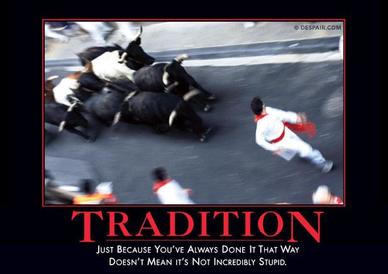I know for a fact that my students are sick and tired of hearing the phrase, "At The Citadel..." It comes up a lot in day-to-day conversations, as life-changing, formative experiences are prone to do. I guess the reason I mention it so much (besides that I have a lot of stories) is because I hope my students don't stop until they find a similar experience that shapes the way they act, think, and see the world around them. Regardless, I've been asked several times since graduation what I learned at The Citadel, as if one could distill four years of experiences into one "listicle." However, after two years of some considerable thought I have been able to pull out distinct threads. This should by no means be taken as an "if you go to The Citadel, you will come out with these things" post, but I'm sure many of my fellow alumni have things on this list they can agree with.
1. Put service to others before yourself (almost always).
This seems pretty self-explanatory, but I don't just mean volunteering in your community or serving in the armed forces (although that is certainly part of it). What is often forgotten is looking out for classmates, friends, coworkers, relatives, bystanders, etc. At The Citadel, those who got the most out of their experience were some of the most selfless, honorable, and thoughtful people I will ever have the fortune to meet. I regret a lot of things in life, and one of the biggest is not doing more for my classmates and friends at The Citadel (especially early on). Constantly ask how you can help others, and then follow through. I added the "almost always" because I also learned that sometimes you do need to take some time for yourself to recharge (possibly to save your sanity), so that you can continue to do your best to help others.
This seems pretty self-explanatory, but I don't just mean volunteering in your community or serving in the armed forces (although that is certainly part of it). What is often forgotten is looking out for classmates, friends, coworkers, relatives, bystanders, etc. At The Citadel, those who got the most out of their experience were some of the most selfless, honorable, and thoughtful people I will ever have the fortune to meet. I regret a lot of things in life, and one of the biggest is not doing more for my classmates and friends at The Citadel (especially early on). Constantly ask how you can help others, and then follow through. I added the "almost always" because I also learned that sometimes you do need to take some time for yourself to recharge (possibly to save your sanity), so that you can continue to do your best to help others.
2. Judge others only by the content of their character.
When I say "judge," I quite obviously do not mean in the biblical sense. In a place where everyone wears the same gray shirt and pants, black shoes etc., the only thing that really mattered to most people was how one treated others. Does Person X put others first? Do they try their hardest to help others? I hate to say that on both of these counts I am not even close to being above reproach. The bottom line is that labels, your economic background, skin color, the quality of your civilian clothes, and the car you drive don't matter. Nobody cares that you came from money or abject poverty. You are all in the same boat, especially during Knob year.
At the same time, there are plenty of people who judge you on your personal presentation. If you show up to a meeting looking unkempt, disheveled, and unshaven, you're not demonstrating many positive character traits (self-discipline, motivation, etc.). People do judge books by their covers (presentation), if not by their topics (labels).
When I say "judge," I quite obviously do not mean in the biblical sense. In a place where everyone wears the same gray shirt and pants, black shoes etc., the only thing that really mattered to most people was how one treated others. Does Person X put others first? Do they try their hardest to help others? I hate to say that on both of these counts I am not even close to being above reproach. The bottom line is that labels, your economic background, skin color, the quality of your civilian clothes, and the car you drive don't matter. Nobody cares that you came from money or abject poverty. You are all in the same boat, especially during Knob year.
At the same time, there are plenty of people who judge you on your personal presentation. If you show up to a meeting looking unkempt, disheveled, and unshaven, you're not demonstrating many positive character traits (self-discipline, motivation, etc.). People do judge books by their covers (presentation), if not by their topics (labels).
3. A "Thank You" note goes a long way.
Too many people in this world go about their lives helping others and are never/rarely thanked. Teachers and professors are often in this category, which is a shame considering the effect they have on so many lives. I wrote "Thank You" notes to my professors (as each had an effect on the teacher and person I have become), and I was too often the only person to ever do so in their entire career up until that point. Take the time (doesn't really even take that long) to hand-write a thoughtful message to someone who has helped shape your life. You could write to a friend, relative, mentor, teacher, coach, secretary, coworker, etc., but make sure the message is heartfelt and sincere. Life is too short not to thank others regularly for all they do for you.
Too many people in this world go about their lives helping others and are never/rarely thanked. Teachers and professors are often in this category, which is a shame considering the effect they have on so many lives. I wrote "Thank You" notes to my professors (as each had an effect on the teacher and person I have become), and I was too often the only person to ever do so in their entire career up until that point. Take the time (doesn't really even take that long) to hand-write a thoughtful message to someone who has helped shape your life. You could write to a friend, relative, mentor, teacher, coach, secretary, coworker, etc., but make sure the message is heartfelt and sincere. Life is too short not to thank others regularly for all they do for you.
4. Bring up problems, but always have a solution.
Complaining might feel good, but can make one look bad if done too often. Never bring up a problem unless you have either a solution or a way to find/develop a solution. The most successful people are those who analyze a problem, come up with several possible solutions, THEN examine the third-order effects of those solutions. Is this solution practical? What does it incentivize? Can we kill two (or three or more) birds with one stone? Is this simply creating more work for others without solving the problem? Has this solution been tried before? Is there a simpler, more elegant solution?
Complaining might feel good, but can make one look bad if done too often. Never bring up a problem unless you have either a solution or a way to find/develop a solution. The most successful people are those who analyze a problem, come up with several possible solutions, THEN examine the third-order effects of those solutions. Is this solution practical? What does it incentivize? Can we kill two (or three or more) birds with one stone? Is this simply creating more work for others without solving the problem? Has this solution been tried before? Is there a simpler, more elegant solution?
5. If you want something done, give it to a busy person. If you want to succeed, be that busy person.
According to the New York Times (citing another report), as of 2014 the average 4-year bachelor's graduation rate is 19%. This is due to many reasons that are currently being debated, but I can trace it back to one thing in particular: we give college students WAY too much free time.
The more you think about this one, the more you remember instances in which you were incredibly busy/productive, but couldn't complete a simple task on time under less-busy circumstances. It's often said that sharks will die if they stop swimming, and I wholeheartedly believe this metaphor applies to real life as well. Busier typically means more productive, which means more reliable/integral. You want to be successful? Be busy, and scroll up to item #1. This relates closely to Parkinson's Law: "Work will expand to fill the time allotted." Anyone who has ever procrastinated knows this to be true!
Also, if something isn't worth doing 100%, it's often not worth doing at all. This point was so important to me that I had the first part of the 2012-3 Sierra Company salute engraved into my Citadel ring: "Give it all... [Nothing less.]"
According to the New York Times (citing another report), as of 2014 the average 4-year bachelor's graduation rate is 19%. This is due to many reasons that are currently being debated, but I can trace it back to one thing in particular: we give college students WAY too much free time.
The more you think about this one, the more you remember instances in which you were incredibly busy/productive, but couldn't complete a simple task on time under less-busy circumstances. It's often said that sharks will die if they stop swimming, and I wholeheartedly believe this metaphor applies to real life as well. Busier typically means more productive, which means more reliable/integral. You want to be successful? Be busy, and scroll up to item #1. This relates closely to Parkinson's Law: "Work will expand to fill the time allotted." Anyone who has ever procrastinated knows this to be true!
Also, if something isn't worth doing 100%, it's often not worth doing at all. This point was so important to me that I had the first part of the 2012-3 Sierra Company salute engraved into my Citadel ring: "Give it all... [Nothing less.]"
6. You can get through more than you think you can, especially if it has an "expiration date."
The phrase you'll often hear at The Citadel is "The days drag, but the weeks fly by." There is no way on Matriculation Day I believed I was going to make it through Knob year, let alone the three succeeding years. The reason I wear the ring AND the weeks (and years for that matter) "fly by" is because cadets spend their whole lives looking forward to things. Lunch meetings, ROTC labs, leave, the weekend, furloughs, the summer, etc. I believe you can get through pretty much anything, as long as you know that the thing has a more or less definite ending time/date. Even if that date is four years in the future...
The phrase you'll often hear at The Citadel is "The days drag, but the weeks fly by." There is no way on Matriculation Day I believed I was going to make it through Knob year, let alone the three succeeding years. The reason I wear the ring AND the weeks (and years for that matter) "fly by" is because cadets spend their whole lives looking forward to things. Lunch meetings, ROTC labs, leave, the weekend, furloughs, the summer, etc. I believe you can get through pretty much anything, as long as you know that the thing has a more or less definite ending time/date. Even if that date is four years in the future...
7. Surround yourself with people who are smarter than you are.
I was very fortunate to be a member of The Citadel's Honors Program, and if there's one thing it taught me it's that there's real value in passionate, well-reasoned discourse. Countless times I'd be sitting in a seminar or lecture and realize just how much smarter my classmates were than me. Not only did this help constantly push me to do my best, but I can't even tell you how much they each taught me. Surround yourself with those smarter than you, and you will perform your best AND have people there to help you when you don't.
I was very fortunate to be a member of The Citadel's Honors Program, and if there's one thing it taught me it's that there's real value in passionate, well-reasoned discourse. Countless times I'd be sitting in a seminar or lecture and realize just how much smarter my classmates were than me. Not only did this help constantly push me to do my best, but I can't even tell you how much they each taught me. Surround yourself with those smarter than you, and you will perform your best AND have people there to help you when you don't.

8. Question everything.
For my last two years, I had the image to the right tacked to my cork board. There were plenty of things we did that were done simply "because they've always been done that way." There are plenty of things we simplified because we kept asking that ever-important question: why? Sometimes the reasons were legitimate, or were solutions to problems that no longer existed. Do whatever you need to in order to become invaluable to a team/organization, which often means asking the tough, probing, and uncomfortable questions. Relentlessly pursue answers (this requires just as much listening as talking), solutions, and streamlining, and refer to #4. You'll be surprised how much people value grit and determination, even if they disagree with you (as long as you are not also incredibly rude).
Nothing bad has really ever come from asking the question “Why?” (at an appropriate time of course). In today’s political climate, there are many people who want to stifle the free exchange of ideas and live in their own personal echo chamber. Many are afraid of finding out that actually they agree with the other side they’re arguing against, because they’ve been told people who don’t think like them are racist bigots or communist mass murderers. Listening to another opinion won’t kill you, and it might strengthen your own argument, teach you something new, or at least humanize the other side. People who fundamentally disagree politically can still be best friends, even today.
For my last two years, I had the image to the right tacked to my cork board. There were plenty of things we did that were done simply "because they've always been done that way." There are plenty of things we simplified because we kept asking that ever-important question: why? Sometimes the reasons were legitimate, or were solutions to problems that no longer existed. Do whatever you need to in order to become invaluable to a team/organization, which often means asking the tough, probing, and uncomfortable questions. Relentlessly pursue answers (this requires just as much listening as talking), solutions, and streamlining, and refer to #4. You'll be surprised how much people value grit and determination, even if they disagree with you (as long as you are not also incredibly rude).
Nothing bad has really ever come from asking the question “Why?” (at an appropriate time of course). In today’s political climate, there are many people who want to stifle the free exchange of ideas and live in their own personal echo chamber. Many are afraid of finding out that actually they agree with the other side they’re arguing against, because they’ve been told people who don’t think like them are racist bigots or communist mass murderers. Listening to another opinion won’t kill you, and it might strengthen your own argument, teach you something new, or at least humanize the other side. People who fundamentally disagree politically can still be best friends, even today.
9. Treat school like work.
See #5 for more information about this, but my biggest piece of advice to my students is to start treating school like a job ASAP. Show up on time, "Give it all" (#5), and realize that someone is, for all intents and purposes, paying you to attend college. Learn something from everything you do and everyone you meet, and you'll do well and be prepared for the "real world."
See #5 for more information about this, but my biggest piece of advice to my students is to start treating school like a job ASAP. Show up on time, "Give it all" (#5), and realize that someone is, for all intents and purposes, paying you to attend college. Learn something from everything you do and everyone you meet, and you'll do well and be prepared for the "real world."
10. Honor still exists.
Honor is "the idea of a bond between an individual and a society as a quality of a person that is both of social teaching and of personal ethos, that manifests itself as a code of conduct, and has various elements such as valor, chivalry, honesty, and compassion." It exists, and we would all do well to live up to these values in our everyday lives.
Honor is "the idea of a bond between an individual and a society as a quality of a person that is both of social teaching and of personal ethos, that manifests itself as a code of conduct, and has various elements such as valor, chivalry, honesty, and compassion." It exists, and we would all do well to live up to these values in our everyday lives.



 RSS Feed
RSS Feed